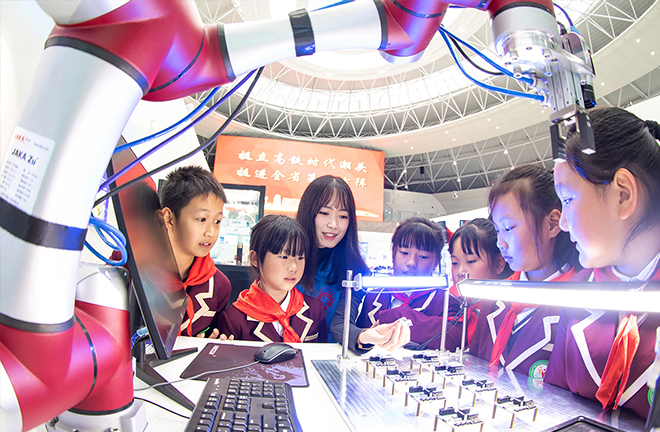Redefining literature in the digital era

Students visit the AI Exhibition Center in Hai’an City, Jiangsu Province. Photo: Zhai Huiyong/CNS
As discussion of the “new liberal arts” continues in academia, it has become incumbent upon new liberal arts to actively explore ways and methods to integrate science, technology, and humanity.
The term “interdisciplinary” does not suggest that disciplines are dissolved or diffused. On the contrary, its real significance lies in breaking through the professional barriers between different disciplines caused by modern society’s excessive division of labor. Relying on human knowledge systems as an entirety, the “kinship” between liberal arts and other disciplines can be rebuilt. By absorbing theories and methods from other disciplines, the discipline itself can be renewed. It is the same for literature.
Since literature was separated from the integrated system of human knowledge as social division of labor intensified, it has developed into an independent disciplinary sphere. This system of division established “territories” that belong to various disciplines, but at the same time, connections between literature and the main body of human knowledge and other disciplinary circles were easily severed, making literature an “isolated island.”
Today, with the wide application of intelligent tools, the popularization of the internet, and the development of information technology, resource sharing among disciplines has become increasingly convenient. The deep integration of science, technology, and humanity has revealed new horizons for literary research, and has brought forth new topics for literary history, theory, and criticism. For example, what is the future of literature in the digital intelligence age? How should the massive volume of digitized texts be processed? Can literary works by AI systems be considered a new genre? Can the digital humanities approach effectively cope with the new task of literary research? All of these have gone beyond the original scope of disciplinary experience, and answers to these questions are urgently needed. If, at the beginning of this century, researchers might yet be hesitant about or even rejected the above questions, then today, as we actively explore the intersection and integration of science, technology, and humanity, more researchers have realized that the convergence of the two has become the topic of our times, and they have begun to gradually accept the above questions. In this way, literature’s domain is expanding.
Take the concept of the “author” as an example. According to previous literary creation theories, the author is regarded as a subject with high literary accomplishments, prominent writing abilities or an outstanding imagination, and is one who pursues novelty with motivation from inspiration or experience. However, great changes have taken place regarding the authors of literature in digital age—Artificial Intelligence (AI) authors have appeared. For example, Microsoft Xiaoice has published three collections of poetry and an online collection of funny words between 2017 to 2020. It also opened a poetry column in the Literature Supplement of the West China Metropolis Daily newspaper. Its literary activities are almost indistinguishable from those of human authors. However, we still cannot equate the author of Xiaoice with the AI framework developed by the Microsoft team. We can neither say that it is equivalent to a computer algorithm, nor can we identify her as the technician who oversees its R&D.
The AI author is more like a synthesis of all these elements, with a completely different technical flavor than that possessed by human authors. It would be hard for traditional literary researchers to acknowledge an AI author, but interdisciplinary scholars from the field of the “new liberal arts” easily accept it and further examine the rationality of an AI author’s existence. Once legitimacy is established for AI authors, we need to determine whether traditional theories on authorship still hold. If technology can produce writers, then is it reasonable to limit the range of literary authors to the level of individual humans? Does originality really exist for literary works, and does a writer’s “inspiration” and “imagination”—which have always been considered mysterious—share the functionality of AI algorithms? If we consider these questions under the framework of our current theories, it will again spark debate on the issue of writing.
In general, current literary research is in urgent need of an overhaul in order to redefine and re-position itself to keep pace with the trends of the times. Although the paradigm for traditional literary research is challenged by the calls for interdisciplinary studies and the need to integrate science, technology, and humanity, it also imparts literature with new vigor and vitality.
Yang Guo is from the Research Center of Humanity and Science at the Southern University of Science and Technology.
Edited by BAI LE
